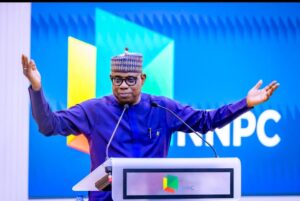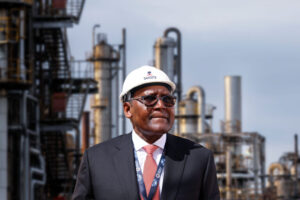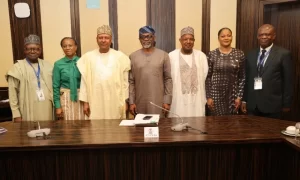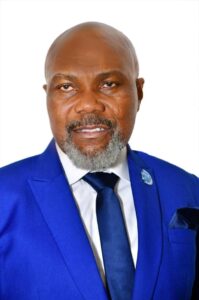

Why the LADOL Free Zone must be allowed to thrive…-MARKSON IBIBO
Markson Ibibo
If anyone thought the drive to encourage Nigerian companies to take front seats in the oil and gas industry would be a walk in the park, they had better reverse their views. Aptly described as a marathon, the Nigerian content journey has faced obstacles and detours which have rendered efforts to grow Nigerian vendors and service providers more tedious, tiring and troublesome.
We have no better example of this than the current campaign of calumny against the Lagos Deep Offshore Logistics (LADOL) Free Zone by nebulous organisations and shadowy individuals who try to disseminate untruths about a matter they know little or nothing about.
This writer does not possess the skills to join them to swim in the whirlpool of misinformation, but he would like to draw attention to the potentially dire implications to Nigerian content development if these naysayers have their say and way.
Located at the Lagos harbour, LADOL Free Zone prides itself as the only 100% indigenous and integrated logistics base in Nigeria, and logistics hub for multinational industrial and offshore companies in the West African sub region.
LADOL Free Zone rose from a virgin swamp land through the sweat of its Nigerian shareholders and stakeholders who envisioned a thriving haven filled with international and Nigerian companies, executing high-risk projects safely and cost-efficiently in Nigeria, thereby servicing the Nigerian and West Africa markets.
Although the first lease in 2004 was with the Nigerian Ports Authority (NPA), the masterplan for the Zone started in 2001.
The Free Zone came alive as a logistics base in 2006, and six years later, it had expanded the base to include a full-fledged round-the-clock logistics and ship repair hub.
In 2013/14, a portion of the LADOL Free Zone was legally subleased to a joint venture company, which was set up specifically to build a Shipyard. A shipyard had been part of LADOL’s masterplan since 2006. With the enactment of the Nigerian Content Act in April 2010, the shipyard idea naturally transformed into a key target for capacity development for Nigeria.
It should therefore not be lost on Nigerians that the world-class fabrication and integration yard now in LADOL exists due to the commitment of the Federal Government as it made it a key deliverable of the Egina field EPC contract of Total Upstream Nigeria Ltd.
Industry experts cheered when the Presidency extended the lease for 25 years in 2018. However, the smiles and cheers risk being marred following a commercial rift between the Lagos Free Zone lessor and operator, Global Resources Management Limited, (GRML) a Member of the LADOL Group of Companies and its subleasee (tenant), Samsung Heavy Industries Nigeria, SHIN.
This dispute was being resolved by the Nigerian Government in 2019, when surprisingly the tenant (SHIN) turned around and proclaimed that they had ousted their Nigerian landlord and partner and seized the land on which the local content capacity development facility, i.e. the shipyard was built.
The tenant went ahead to barricade the Nigerian facility, illegally and without any valid approval erected their own private access and proceeded to operate as if they were their own Free Zone. This was perplexing.
Just two months ago, the Presidency revalidated the extension it granted in 2018, reigniting hopes that the attempt to undermine a Nigerian content landmark will fail.
Sadly, the dispute between GRML and its tenant (SHIN) resulted in several litigations and arbitrations both within and outside Nigeria and dragging in many ministries and regulatory agencies. In their wisdom and in line with the law, these ministries and agencies have resolved the regulatory aspects of the dispute, in such a way that local content is protected, not just for the shipyard but also for the many other budding capacity development projects.
Since then, spurious claims have been made which this columnist has had a chance to investigate and review. Without dignifying falsehood, one example will do. It has been alleged without any iota of evidence that LADOL pocketed billions of dollars as rent and played a fast one on the landlord, NPA. This writer has seen documents proving that LADOL only collected USD4.5 million as rent, while the balance was kept by the tenant (SHIN) as investment by LADOL into the shipyard, which the tenant constructed as contractor. In fact, before the arrival of LADOL’s tenant (SHIN) in 2013, the LADOL Free Zone was fully operational, with established and functional facilities, which attracted the tenant. It is interesting to note that the tenant (SHIN) went on to use LADOL to qualify for and win the approximately USD 4 billion Egina Field EPC contract.
This writer has also seen records which confirm that LADOL’s sole obligation under its lease agreement with NPA is to pay its rent and seek approval of the lessor in respect of any sublease. It has not been denied that GRML has fully paid its rent on its leased land up to date. For the period of 2018 – 2020 the sum of N880 Million at N440 Million per annum was paid to NPA.
We also saw a letter from NPA, from March 2014, in which NPA gave explicit approval for the sublease issued by GRML to its tenant (SHIN). It is ironic that the same tenant (SHIN) that is attacking LADOL in the media for charging it rent, actually kept 90% of this rent for itself as part payment for its role in building the shipyard in LADOL as a contractor.
The LADOL Free Zone is on Nigerian soil. All the investments in the hub remain on Nigeria’s soil for the benefit of the economy and the people of Nigeria forever. This is a patriotic and strategic investment in Nigeria hence ultimate ownership of the land continues to be the Federal Government of Nigeria. Our concerns now as Nigerians, at this tough time, should be for the protection of the economy, local jobs and local investments.
The Presidency has spoken well on this matter – we should all come together as stakeholders to see how we can contribute to capacity development across Nigeria that will make us more self-sufficient, grow local industries and manufacturing capacity to make the country an industrial hub for Africa.We can and should do it.
***Markson Ibibo an oil industry analyst and public affairs commentator





